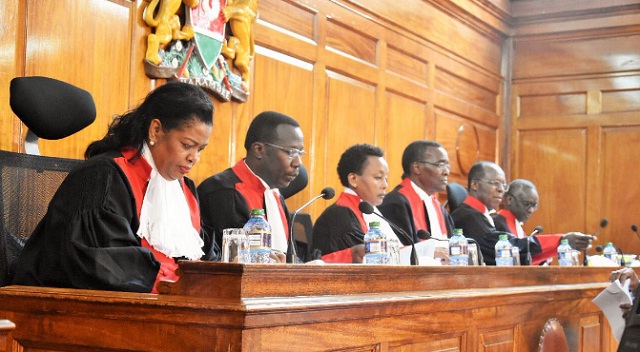
“In my view, therefore, I could not see any rational or defensive alternative to answering issue No.3 other than in the alternative.” However, ultimately the majority voted to maintain the election results.
Justices like Kanyeihamba, have since publicly acknowledged the pressure that judges were under from the executive in both the 2001 and 2006 petitions.
Many observers say presidential elections across the continent are often defective and fraudulent which forces aggrieved parties to look to the judiciary for redress. But the courts rarely cancel a presidential election. In the case of Uganda, the political implications for security, peace, and stability were reportedly judged to be too immense for the Supreme Court judges to unleash them with a nullification of the vote.
Justice Remmy Kasule’s idea
Justice Kasule appeared to be searching for a fair and transparent redress mechanism that is unencumbered by national consideration. The assumption is that the decision of a regional court would command the respect of the people and, therefore, lends legitimacy and credibility to the election and serves as a possible mitigation to violent post-election response.
Retired Tanzanian Supreme Court judge Eusebia Munuo and Ugandan law scholars Prof. Frederick Ssempebwa, Dr. Businge Kabumba, and Justice Prof. Lilian Tibatemwa Ekirikubinza, in their book titled `A comparative Review of Presidential Election Court Decisions in East Africa’ make a similar point. They note that for independence of the judiciary to hold in such tensed up circumstances as a presidential election petition, contesting political forces must have a bare minimum level of balance with no over bearing party controlling all the institutions.
Justice Kasule thinks creating a legally-binding supra-national Supreme Court for East Africa could be the answer to creating sanity within East Africa.
“If we are to make East Africa strong, let us begin to act as East Africans where we can put our act together and push the positive values that can push us forward,” he said.
“If there is a matter arising in each of the member states, then the court would choose members from each of those benches to handle the contentious cases,” Kasule said.
Kasule said this kind of jurisprudence would go a long way in addressing the needs of each and every East African citizen.
Dr. Mutunga said since presidential elections are often divisive to the extent that whenever a presidential election petition goes to the Supreme Court and judgment is made, the national judiciaries often suffer, this would be a good idea. But he modified it slightly.
This court, Mutunga said, would be very ideal where judges from, for instance, Kenya, Rwanda, and Tanzania preside over a presidential petition in Uganda and those in Uganda, Kenya and South Sudan hear a petition on Burundi.
“It would lessen the perspective of this judge was bribed,” he said.
Mutunga was also quick to add that, this kind of structure would get stuck at some point considering that East Africans are quite closely related (ethnically) and networked.
“Still, a structure that handles presidential petitions and other political decisions that tend to dent the image of the national judiciary is worth trying,” he said.
Not a good idea
But Crispy Kaheru, the Coordinator of the Citizens Coalition for Electoral Democracy in Uganda (CCEDU) told The Independent on Dec. 8 that such a proposal is likely to be affected by the principle of sovereignty.
Kaheru said no country can “sell” its sovereignty to a different country. He said he cannot fathom a model that has brought different judges from different countries even when you want to cure things like partisanship and biases.
“Foreigners could only come in to help indigenous bodies to do their job well; that should be the same concept in East Africa whereby you still retain the Supreme Court of the land to do a determination of a presidential election petition but you can strengthen it by providing amicus support from outside the country.”
 The Independent Uganda: You get the Truth we Pay the Price
The Independent Uganda: You get the Truth we Pay the Price





